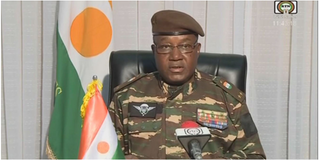US cuts aid to Niger as France starts troop pullout

General Abdourahamane Tiani, Niger’s new strongman, speaking on national television on July 28, 2023 after the ouster of President-elect Mohamed. Photo/AFP
What you need to know:
- Niger's military regime announced on state television late Tuesday that it escorted the first convoy of French soldiers from their base in the western town of Ouallam "in the direction of Chad".
The first convoy of French troops withdrew from Niger on Tuesday after being ordered out by coup leaders as the United States also cut off more than $500 million in assistance to the insurgency-hit Sahel nation.
Niger's military regime announced on state television late Tuesday that it escorted the first convoy of French soldiers from their base in the western town of Ouallam "in the direction of Chad".
The withdrawal of French forces was quickly demanded by Niger's new ruling generals after they took power on July 26, with French President Emmanuel Macron confirming in September their departure, a process that Paris expects to be completed by the end of the year.
Around 1,000 French troops were stationed in Niamey, with another 400 deployed at two forward bases in the northwest, near Mali and Burkina Faso, a hotbed of insurgent activity.
In addition to the departure by land, "three special flights" have been registered at the airport in Niamey, two for the departure of "97 special forces elements" and one "dedicated to logistics".
Washington earlier Tuesday declared that Niger's ousting of a democratic government -- seen as a key bulwark against Russia -- had been a coup.
"Any resumption of US assistance will require action ... to usher in democratic governance in a quick and credible timeframe," State Department spokesman Matthew Miller said.
The United States, along with West African nations and former colonial power France, had been pressing the military to restore President Mohamed Bazoum.
"We're taking this action because over the last two months, we've exhausted all available avenues to preserve the constitutional order in Niger," a senior US official added.
The United States is keeping about 1,000 military personnel in Niger, but they are no longer actively training or assisting Niger forces, another US official said.
They will continue to work to monitor threats from jihadists.
Logistical headache
French troops have been living with uncertainty since the new regime began demanding their departure, with irregular supplies of food and repeated anti-French demonstrations outside the Niamey base.
Their withdrawal was expected to cause logistical headaches, with few safe routes out of a region plagued by myriad jihadist groups.
Niger's land borders with Benin and Nigeria have been closed since the coup.
France had previously reinforced its presence in Niger, adding armoured vehicles and helicopters to the drones and fighter jets that were already deployed.
It is the third time in 18 months that French troops have been sent packing by a former African colony, dealing a severe blow to France's influence on the continent and prestige on the international stage.
France's ambassador to Niger was also given his marching orders by the leaders of the coup that toppled the French-backed president.
Pivot away from Paris
Niamey's military rulers had labelled the announcement of France's diplomatic and troop withdrawals in September as a "step towards the sovereignty of Niger".
Mali and Burkina Faso, which have also undergone coups in the past two years, have also turned their backs on France, accusing it of a colonialist attitude and of failing to effectively combat jihadists.
Mali has pivoted towards Moscow, bringing in mercenaries from the notorious Wagner group.
In Niger, anti-French demonstrators have also been seen waving Russian flags -- scenes in stark contrast to rejoicing that greeted French troops in 2013 when they helped liberate northern Mali from Al-Qaeda-affiliated insurgents.
Niger had in recent months been acting as a regional hub for French troops helping armies in the region fight Islamist insurgents.
Macron initially attempted to keep his troops and ambassador in the country, but in late September gave into pressure to bring them home after months of anti-French protests.
France still insists that Bazoum's ousted government remains the sole legitimate authority. The former president remains under house arrest in Niamey.





